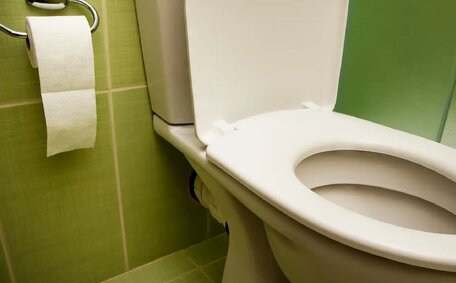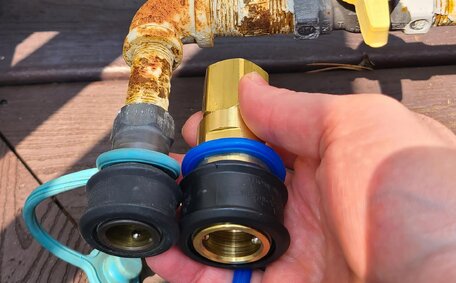Understanding How a Septic System Works
A septic system consists of two primary components: the septic tank and the drain field. When functioning optimally, septic systems shouldn’t release any odours, ensuring they remain unnoticeable to residents.
Your septic tank collects wastewater from your household, separating solids which settle at the bottom and allowing liquids to flow into underground pipes for microbial decomposition.
A septic system efficiently processes wastewater from your home, preventing contamination of fresh water sources and your yard.
It’s crucial to pump your septic system every 2-3 years to mitigate environmental harm and circumvent costly repairs.
Recognizing Warning Signs of Septic Tank Issues
Identifying early signs of septic tank issues is key to preventing expensive repairs down the line. There are several clear signs that your septic tank needs attention:
Sewage Odours Around Your Home
A septic tank requiring immediate attention often emits foul odours. If you notice sewage smells around your home, especially near drains, it likely means these are signs of a full septic tank with solids backing up into your plumbing.
Slow or Clogged Drains
Slow drains often point to septic tank drain field issues and warrant immediate attention. This usually starts with toilets but can spread to other sinks and showers over time as the backup gets worse.
Standing Water Around Your Tank
Excess water pooling above or near the septic tank cleaning field could indicate your system cannot process your usage levels. If you notice standing water or soggy soil near your septic tank, have it inspected immediately.
Slow or Backed-Up Drains
Slow drains can be a sign of a nearly full septic tank, suggesting a pump-out is necessary. Try plunging your drain or using commercial drain cleaners first, because it’s time to rule out simple clogs before assuming you have a septic tank issue.
However, if all fixtures in your home start exhibiting sluggish drainage at the same time, it likely signals excess solid waste in your tank that cannot be processed quickly enough. Call a professional inspector if plunging and snaking drains provides no relief - you may need your tank pumped or risk your sewer line backup flooding into your home.
Water backing up into your home is a clear sign that you require septic tank services, indicating the tank is full.
Gurgling Sounds in Plumbing
Hearing gurgling noises from your sinks, showers or toilet bowls can signal an issue with your septic tank. Hearing gurgling noises from your sinks, showers or toilet bowls can signal an issue with your septic tank.
It usually means there is a partial blockage inside water your septic system, affecting the sinks toilets, or that the tank is full and cannot accept more wastewater flow.
Gurgling sounds in your plumbing can indicate a septic tank struggling to drain sewage properly. Solids may be accumulating faster than usual or partially blocking the outlet pipe that transfers liquid to the drain field, indicating the tank needs pumped. A professional inspection can determine if pumping your septic tank simply needs to be carried out or if there are larger problems needing repair.
Avoid dismissing gurgling noises from plumbing fixtures as they may point to significant septic tank problems.
If your septic tank is making these noises, it’s likely at full capacity and unable to cope with daily water usage. Call for septic services to assess if pumping out solid sludge and scum is enough to restore proper drainage, or if there is a septic tank failure that requires replacement of septic components.
Foul Sewage Odors
Foul sewage odours around your home unmistakably indicate that your septic system urgently needs attention. Unpleasant rotten egg and sewage smells are a red flag that ought to make you call septic professionals, signalling that waste solids are backing up into your plumbing rather than properly flowing out to the drain field.
Foul odours emerge when the drainfield is overwhelmed and can no longer process waste, causing sewage backup. Excess solid sludge and scum accumulates when out your tank isn’t pumped regularly.
With no room for liquid waste to flow out to the next stage, sewage backing up into home fixtures can occur, affecting sinks, showers, and tub drains. Sewage gases containing hydrogen sulphide and methane leak out with the backed up wastewater, creating those nasty smells.
Ignoring unpleasant sewage smells is inadvisable, as they indicate an overloaded and failing tank. Call a professional to inspect immediately, as you’ll likely need the tank pumped out and potentially have clogged pipes or a failing system that a septic tank can necessitate replacement.
Wet Spots or Standing Water Near Tank
Seeing lush green spots or standing water on your lawn near your septic tank or drain field likely signals that your system is failing to properly process waste. Water pooling above the tank or drain field suggests the soil is failing to absorb effluent as quickly as it’s produced.
When septic systems cannot keep up with the incoming flow of wastewater, untreated sewage can break through to the surface. This standing water or muddy soil contains biological contaminants which pose serious health hazards if contacted. The excess water can also kill vegetation and seep towards nearby waterways, causing hazardous environmental damage.
It is crucial to address standing water or flooding near the tank and drain field immediately. It usually means your septic tank is overloaded and can no longer filter out solids while facilitating drainage adequately. Call a professional inspector immediately to prevent worsening property damage and potential groundwater contamination.
Consequences of Neglecting Septic Tank Problems
Ignoring issues with septic tanks can result in severe damage and substantial repair costs. If problems are ignored, solids and wastewater backing up into home can cause foul odours, flooding, and water damage. Raw sewage in your home poses severe health risks due to bacteria and contaminants.
Continued neglect also threatens environmental damage as untreated sewage overflows from the tank or leaches into surrounding soil and groundwater. Hazardous biological contaminants will kill vegetation and can spread illness through waterways or wells. Ignoring septic issues could make you responsible for costly environmental remediation.
Putting off needed septic repairs, like those caused by tree roots, allows minor problems to escalate over time. Issues like cracked pipes, tank corrosion and drain field failure will become worse and more difficult to fix if not addressed early on. The costs to reconstruct an entire damaged septic system can easily exceed $20,000.
Don’t delay - the best way to address issues is to call a professional septic service company right away if you notice any warning signs. Regular inspections and maintenance like pumping can prevent most issues. It’s far less costly to pump out solids every 2-3 years than face sewage flooding in your home or environmental violations.
When to Call a Professional
If you observe any warning signs, it’s vital to contact a professional septic service immediately. An experienced technician can conduct a thorough inspection to accurately diagnose issues and determine if pumping or repairs are needed.
Professionals possess expertise and specialised tools to locate tanks, gauge liquid levels, measure sludge and scum, and evaluate component function. Scheduled septic tank inspections every 2-3 years can detect problems before they become expensive to repair. Pumping is typically recommended every 3-5 years to remove solid buildup.
Don’t delay - the longer you put off needed septic service, the worse any problems may become. Prevent plumbing backups, flooding, groundwater contamination, and other hazards by hiring experts to address issues promptly. Safeguard your home, health, and environment with regular professional maintenance.
Regular Septic Tank Pumping and Maintenance
Similar to maintaining a website, regular septic tank pumping every 2-3 years is vital for extending your system’s lifespan. Routine pumping removes accumulated solids, sludge and scum, allowing wastewater to flow freely to the drain field for treatment and dispersal into the soil.
Below, you’ll find some tips to keep your septic system properly maintained between professional pumpings:
- Opt for natural cleaners and minimise antibacterial product usage to protect beneficial bacteria in the tank.
- Stagger usage of water-heavy appliances like washing machines to avoid overloading your system’s daily capacity.
- Avoid pouring fats, oils, and grease down the drain to prevent clogs in pipes and grease traps.
- Limit use of garbage disposals and installation of water softeners which increase solids entering the tank.
- Keep an eye out and inspect around tank/drain field monthly for odours, wet spots or backed up drains that could indicate an issue.
Regular septic pumping can prevent a multitude of avoidable issues. When solids fill the tank, they can pressure pipes and compact the soil in the drain field, disrupting wastewater dispersal. Flooding, backups and environmental contamination become increasingly likely over time without regular maintenance.
How We Can Help
At Ryde Plumbing, we are experts when it comes to diagnosing and resolving septic tank issues promptly. With over 10 years serving the Ryde area, we have seen it all and can accurately assess any problems to get your system back to flowing freely.
We offer the following septic repair and maintenance services for residential and commercial properties:
- Emergency unblocking of backed up plumbing and porta potty overflows
- Septic tank pumping to remove excess solids and sludge
- Inspections to check liquid levels, pipe condition and drain field functionality
- Detailed reports assessing overall system health with photos/videos
- Comprehensive repairs and replacement of damaged septic system components
- Yearly maintenance plans to optimise system lifespan through routine pumping
Located in Ryde, we proudly service all surrounding suburbs.
If you notice any of the concerning signs described in this article, don’t hesitate to call Ryde Plumbing on 1300 349 338 or email jobs@rydeplumbingservices.com.au. Our licenced technicians are ready to inspect your septic tank and take necessary action to restore proper functioning.
Safeguard your home against overflow and environmental harm with prompt repairs. Contact us today to discuss your options!






